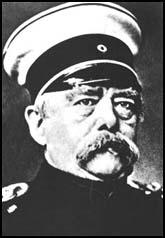Otto von Bismarck

Otto von Bismarck was born in Brandenburg, Germany in 1815. He studied law and agriculture and in 1847 entered the new Prussian Parliament as a ultra-royalist who was totally opposed to democracy. During the 1848 Revolutions he argued against constitutional reform but as a member of the Federal German Diet at Frankfurt demanded equal rights for Prussians.
Bismarck served as a foreign ambassador in Russia (St. Petersburg: 1859) and France (Paris: 1862). Recalled in 1862 he became President of Prussia. Over the next few years Bismarck helped to reorganize Germany under the leadership of Prussia.
In 1870 Bismarck deliberately provoked the Franco-Prussian War and as a result was able to obtain Alsace and Lorraine from France. To counteract the danger of Russia and France joining forces against Germany, Chancellor Bismarck formed the Triple Alliance in 1879.
Bismarck dealt severely with trade unionists but in an effort to reduce the appeals of socialism, Bismarck he introduced the world's first modern welfare scheme which provided sickness, accident and old age benefits (1883-87).
After a dispute with Kaiser Wilhelm II, Bismarck resigned from office in March, 1890. Otto von Bismarck, who spent the rest of his life in retirement, died in 1898.

